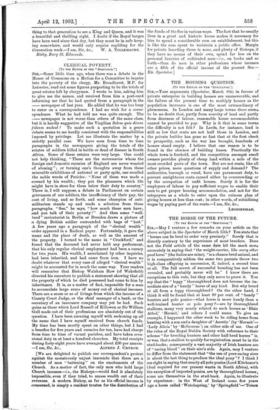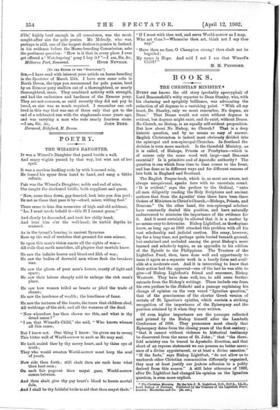THE HORSE OF THE FUTURE.
'[TO THE EDITOR OF THE " SPECTATOR:1
Sm,—May I venture a few remarks on your article on the above subject in the Spectator of March 15th P You state that " horses can be bred to order very precisely." Surely that is directly contrary to the experience of most breeders. Does not the Field article of the same date hit the mark more accurately in saying that "the weight-carrier, like every other good horse" (the italics are mine), "is a chance-bred animal, and it is comparatively seldom the same two parents throw two high-class offspring in succession, if, indeed, a second time at all. The full secret of successful breeding has not been revealed, and probably never will be." I know there are exceptions to this rule, but they only serve to prove it. You say that the " leggy " thoroughbred does not become the im- mediate sire of a " handy " horse of any kind. But why breed at all from a leggy thoroughbred P On the other hand, I think it will be found that at least 90 per cent. of " handy " hunters and polo ponies—what horse is more bandy than a well-trained hunter or polo pony P—are by thoroughbred stallions, many very nearly related to such horses as Blair Athol,' Hermit,' and others I could name. To give an example, I happened the other week to be riding home from hunting with a son and a daughter of Ascetic' (by Hermit'— 'Lady Alicia' by Melbourne ') on either side of me. One of the rules of the Royal Dublin Society with reference to their scheme " for breeding hunters and other half-bred horses " is, or was, that a stallion to qualify for registration must be in the stud-books ; consequently a vast majority of Irish hunters are of " racing blood " on their sire's side. Again, may I venture to differ from the statement that "the use of pure racing sires is about the last thing to produce the ideal pony" P I think I am right in saying that nearly all polo ponies (Lord Kitchener's ideal required for our present wants in South Africa), with the exception of imported ponies, are by thoroughbred horses ; some are themselves in the stud-book. Again, to illustrate by experience : in the West of Ireland some few years ago a horse called Watchapring,' by Springfield'—' Tolson d'Or,' highly bred enough in all conscience, was the most- sought-after sire for polo ponies. Mr. Meleady, who was, perhaps is still, one of the largest dealers in ponies in Ireland, in his evidence before the Horse-breeding Commission, asks the pertinent question : "How is it that in every place I ever get offered a Watchspring ' pony I buy it? "—I am, Sir, &c.,











































 Previous page
Previous page